Fleurs du Mal Magazine


Or see the index
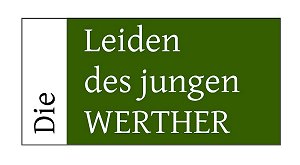
The Sorrows of Young Werther
Die Leiden des jungen Werther (01)
by J.W. von Goethe
Translated by R.D. Boylan
PREFACE
I have carefully collected whatever I have been able to learn of the story of poor Werther, and here present it to you, knowing that you will thank me for it. To his spirit and character you cannot refuse your admiration and love: to his fate you will not deny your tears.
And thou, good soul, who sufferest the same distress as he endured once, draw comfort from his sorrows; and let this little book be thy friend, if, owing to fortune or through thine own fault, thou canst not find a dearer companion.
BOOK I
4 May 1771
How happy I am that I am gone! My dear friend, what a thing is the heart of man! To leave you, from whom I have been inseparable, whom I love so dearly, and yet to feel happy! I know you will forgive me. Have not other attachments been specially appointed by fate to torment a head like mine? Poor Leonora! and yet I was not to blame. Was it my fault, that, whilst the peculiar charms of her sister afforded me an agreeable entertainment, a passion for me was engendered in her feeble heart? And yet am I wholly blameless? Did I not encourage her emotions? Did I not feel charmed at those truly genuine expressions of nature, which, though but little mirthful in reality, so often amused us? Did I not–but oh! what is man, that he dares so to accuse himself? My dear friend I promise you I will improve; I will no longer, as has ever been my habit, continue to ruminate on every petty vexation which fortune may dispense; I will enjoy the present, and the past shall be for me the past.
No doubt you are right, my best of friends, there would be far less suffering amongst mankind, if men–and God knows why they are so fashioned–did not employ their imaginations so assiduously in recalling the memory of past sorrow, instead of bearing their present lot with equanimity. Be kind enough to inform my mother that I shall attend to her business to the best of my ability, and shall give her the earliest information about it. I have seen my aunt, and find that she is very far from being the disagreeable person our friends allege her to be. She is a lively, cheerful woman, with the best of hearts. I explained to her my mother’s wrongs with regard to that part of her portion which has been withheld from her. She told me the motives and reasons of her own conduct, and the terms on which she is willing to give up the whole, and to do more than we have asked. In short, I cannot write further upon this subject at present; only assure my mother that all will go on well.
And I have again observed, my dear friend, in this trifling affair, that misunderstandings and neglect occasion more mischief in the world than even malice and wickedness. At all events, the two latter are of less frequent occurrence.
In other respects I am very well off here. Solitude in this terrestrial paradise is a genial balm to my mind, and the young spring cheers with its bounteous promises my oftentimes misgiving heart. Every tree, every bush, is full of flowers; and one might wish himself transformed into a butterfly, to float about in this ocean of perfume, and find his whole existence in it.
The town itself is disagreeable; but then, all around, you find an inexpressible beauty of nature. This induced the late Count M to lay out a garden on one of the sloping hills which here intersect each other with the most charming variety, and form the most lovely valleys. The garden is simple; and it is easy to perceive, even upon your first entrance, that the plan was not designed by a scientific gardener, but by a man who wished to give himself up here to the enjoyment of his own sensitive heart. Many a tear have I already shed to the memory of its departed master in a summer-house which is now reduced to ruins, but was his favourite resort, and now is mine. I shall soon be master of the place. The gardener has become attached to me within the last few days, and he will lose nothing thereby.
The Sorrows of Young Werther (Die Leiden des jungen Werther) by J.W. von Goethe. Translated by R.D. Boylan.
To be continued
fleursdumal.nl magazine
More in: -Die Leiden des jungen Werther, Archive G-H, Goethe, Johann Wolfgang von
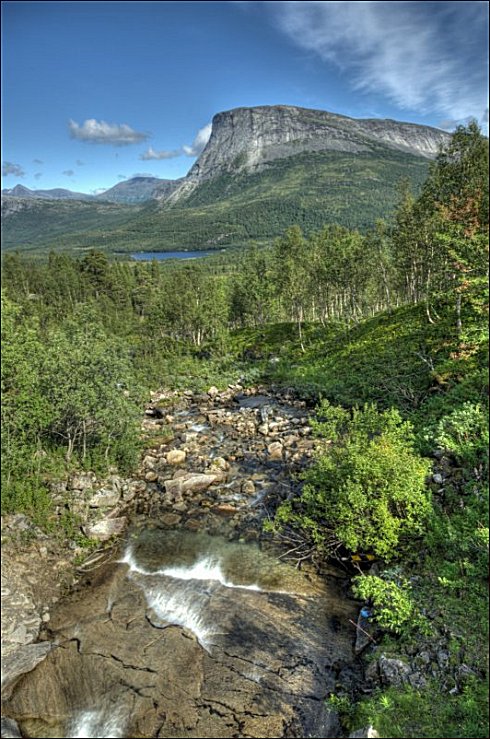
Johann Wolfgang von Goethe
(1749-1832)
Natur und Kunst
Natur und Kunst, sie scheinen sich zu fliehen,
Und haben sich, eh’ man es denkt, gefunden;
Der Widerwille ist auch mir verschwunden,
Und beide scheinen gleich mich anzuziehen.
Es gilt wohl nur ein redliches Bemühen!
Und wenn wir erst in abgemeßnen Stunden;
Mit Geist und Fleiß uns an die Kunst gebunden,
Mag frei Natur im Herzen wieder glühen.
So ist’s mit aller Bildung auch beschaffen:
Vergebens werden ungebundne Geister
Nach der Vollendung reiner Höhe streben.
Wer Großes will, muß sich zusammenraffen:
In der Beschränkung zeigt sich erst der Meister,
Und das Gesetz nur kann uns Freiheit geben.
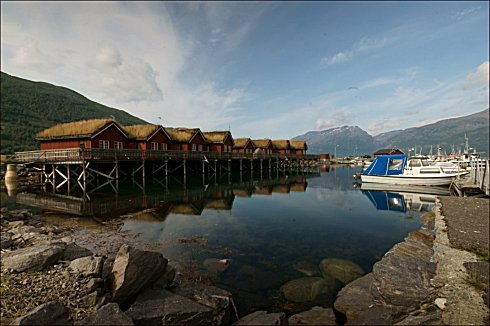
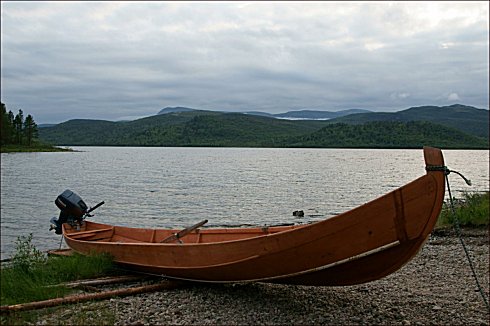
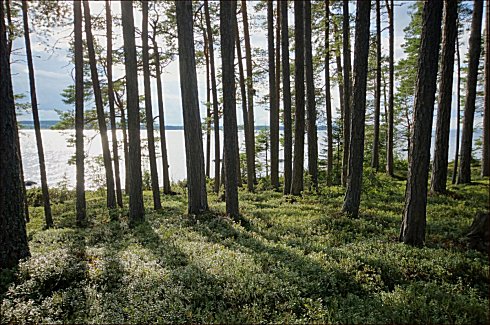
Hans Hermans photos – Natuurdagboek 12-11
Gedicht Johann Wolfgang von Goethe
kempis.nl poetry magazine
More in: Archive G-H, Goethe, Johann Wolfgang von, Hans Hermans Photos

.jpg)
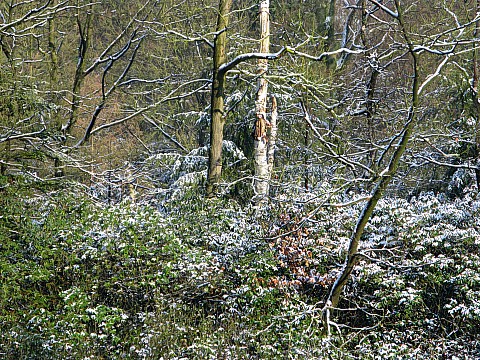

Johann Wolfgang von Goethe
(1749–1832)
Natur und Kunst, sie scheinen sich zu fliehen …
Natur und Kunst, sie scheinen sich zu fliehen
Und haben sich, eh man es denkt, gefunden;
Der Widerwille ist auch mir verschwunden,
Und beide scheinen gleich mich anzuziehen.
Es gilt wohl nur ein redliches Bemühen!
Und wenn wir erst in abgemeßnen Stunden
Mit Geist und Fleiß uns an die Kunst gebunden,
Mag frei Natur im Herzen wieder glühen.
So ist’s mit aller Bildung auch beschaffen:
Vergebens werden ungebundne Geister
Nach der Vollendung reiner Höhe streben.
Wer Großes will, muß sich zusammenraffen;
In der Beschränkung zeigt sich erst der Meister,
Und das Gesetz nur kann uns Freiheit geben.
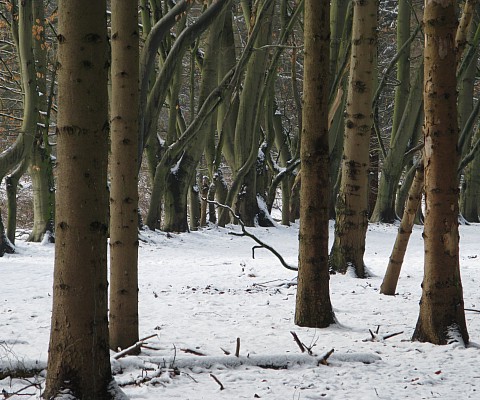

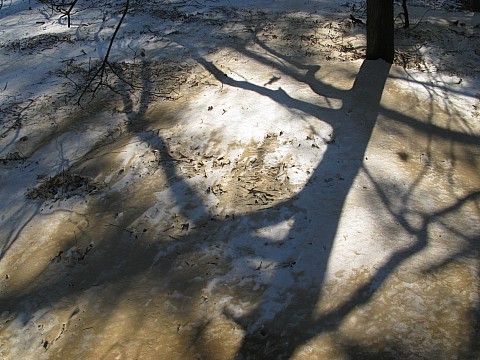
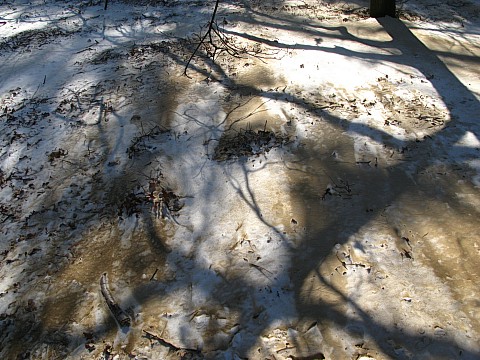

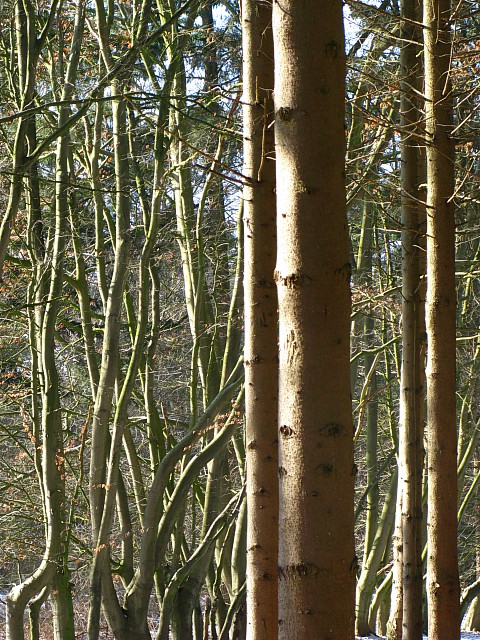
Photos: Ton van Kempen
Poem: Johann Wolfgang von Goethe
kempis poetry magazine
More in: 4SEASONS#Winter, Goethe, Johann Wolfgang von, Ton van Kempen Photos
.jpg)
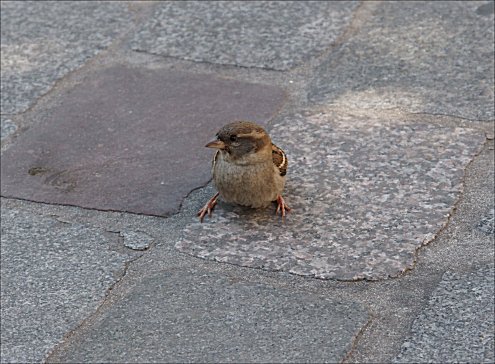

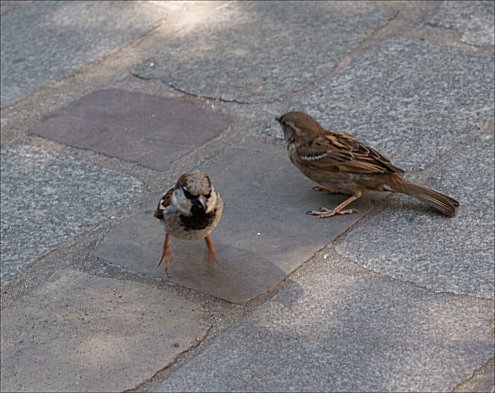
Johann Wolfgang von Goethe
(1749 – 1832)
Es fing ein Knab’ ein Vögelein
Es fing ein Knab’ ein Vögelein,
Hm! Hm!
Da lacht’ er in den Käfig ’nein
Hm! Hm!
So! So!
Hm! Hm!
Der freut’ sich traun so läppisch
Hm! Hm!
Und griff hinein so täppisch,
Hm! Hm!
So! So!
Hm! Hm!
Da flog das Meislein auf ein Haus
Hm! Hm!
Und lacht den dummen Buben aus,
Hm! Hm!
So! So!
Hm! Hm!
.jpg)

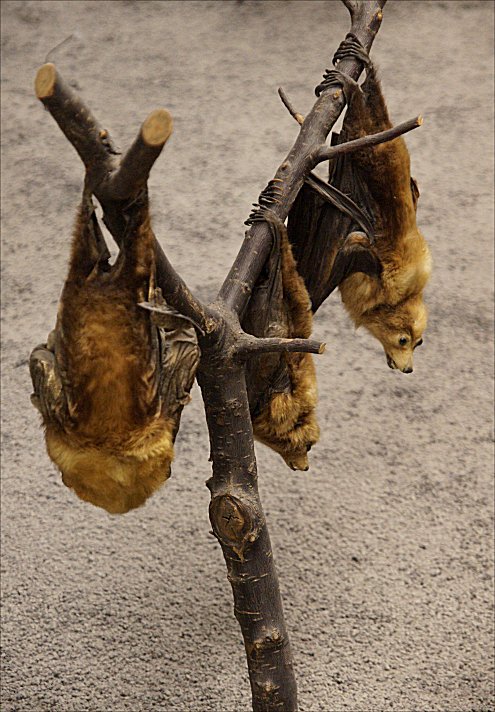
Hans Hermans Natuurdagboek Juli 2009
Foto’s: Hans Hermans
Gedicht: Johann Wolfgang von Goethe
kemp=mag poetry magazine – magazine for art & literature
More in: Goethe, Johann Wolfgang von, Hans Hermans Photos, MUSEUM OF NATURAL HISTORY - department of ravens & crows, birds of prey, riding a zebra, spring, summer, autumn, winter
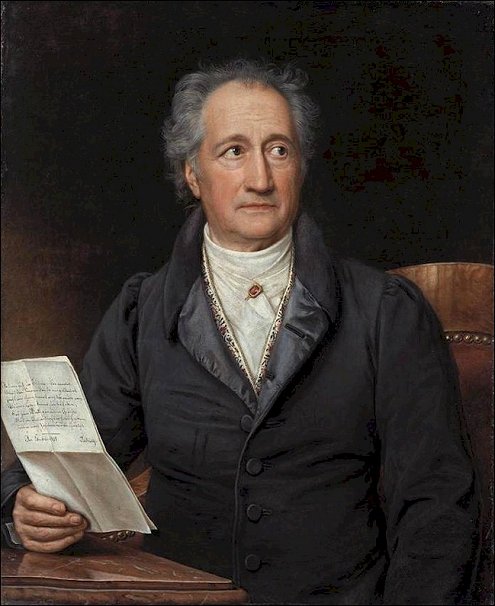
Johann Wolfgang von Goethe
(1749 – 1832)
D e r F i s c h e r
Das Wasser rauscht‘, das Wasser schwoll,
Ein Fischer saß daran,
Sah nach dem Angel ruhevoll,
Kühl bis ans Herz hinan.
Und wie er sitzt, und wie er lauscht,
Teilt sich die Flut empor;
Aus dem bewegten Wasser rauscht
Ein feuchtes Weib hervor.
Sie sang zu ihm, sie sprach zu ihm:
Was lockst du meine Brut
Mit Menschenwitz und Menschenlist
Hinauf in Todesglut ?
Ach wüßtest du, wie‘s Fischlein ist
So wohlig auf dem Grund,
Du stiegst herunter, wie du bist,
Und würdest erst gesund.
Labt sich die liebe Sonne nicht,
Der Mond sich nicht im Meer ?
Kehrt wellenatmend ihr Gesicht
Nicht doppelt schöner her ?
Lockt dich der tiefe Himmel nicht,
Das feuchtverklärte Blau ?
Lockt dich dein eigen Angesicht
Nicht her in ew‘gen Tau ?
Das Wasser rauscht‘, das Wasser schwoll,
Netzt‘ ihm den nackten Fuß;
Sein herz wuchs ihm so sehnsuchtsvoll,
Wie bei der Liebsten Gruß.
Sie sprach zu ihm, sie sang zu ihm;
Da war‘s um ihn geschehn:
Halb zog sie ihn, halb sank er hin,
Und ward nicht mehr gesehn.
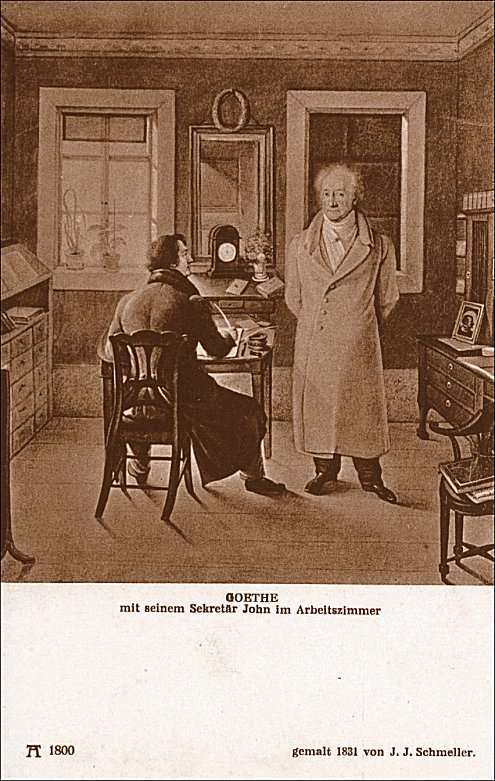
KEMP=MAG poetry magazine
More in: Goethe, Johann Wolfgang von
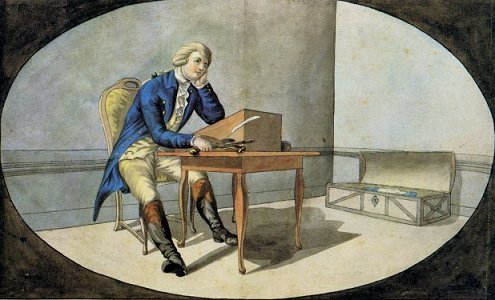
Johann Wolfgang von Goethe
(1749-1832)
Neue Liebe, neues Leben
Herz, mein Herz, was soll das geben ?
Was bedränget dich so sehr ?
Welch ein fremdes , neues Leben !
Ich erkenn dich nicht mehr.
Weg ist alles was du liebtest,
Weg, warum du dich betrübtest,
Weg dein Fleiß und deine Ruh –
Ach, wie kamst du nur dazu !
Fesselt dich die Jugendblüte,
Diese liebliche Gestalt,
Dieser Blick voll Treu und Güte
Mit unendlicher Gewalt?
Will ich rasch mich ihr entziehen,
Mich ermannen, ihr entfliehen,
Führet mich im Augenblick,
Ach, mein Weg zu ihr zurück.
Und an diesem Zauberfädchen,
Das sich nicht zerreißen läßt,
Hält das liebe lose Mädchen
Mich so wider Willen fest;
Muß in ihrem Zauberkreise
Leben nun auf ihre Weise.
Die Veränderung, ach, wie groß !
Liebe! Liebe! Laß mich los !
Nähe des Geliebten
Ich denke dein, wenn mir der Sonne Schimmer
Vom Meere strahlt;
Ich denke dein, wenn sich des Mondes Flimmer
In Quellen malt.
Ich sehe dich, wenn auf dem fernen Wege
Der Staub sich hebt;
In tiefer Nacht, wenn auf dem schmalen Stege
Der Wandrer bebt.
Ich höre dich, wenn dort mit dumpfem Rauschen
Die Welle steigt.
Im stillen Haine geh ich oft zu lauschen,
Wenn alles schweigt.
Ich bin bei dir, du seist auch noch so ferne,
Du bist mir nah !
Die Sonne sinkt, bald leuchten mir die Sterne
O wärst du da !
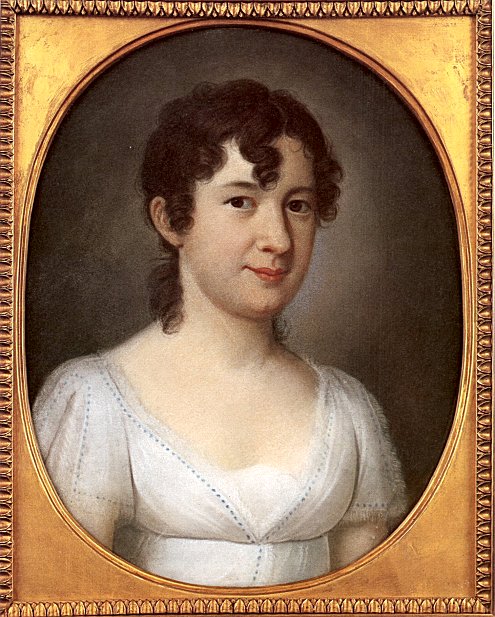
Die Liebende schreibt
Ein Blick von deinen Augen in die meinen,
Ein Kuß von deinem Mund auf meinem Munde,
Wer davon hat, wie ich, gewisse Kunde,
Mag dem was anders wohl erfreulich scheinen ?
Entfernt von dir, entfremdet von den Meinen,
Führ ich stets die Gedanken in die Runde,
Und immer treffen sie auf jene Stunde,
Die einzige; da fang ich an zu weinen.
Die Träne trocknet wieder unversehens:
Er liebt ja, denk ich, her in diese Stille,
Und solltest du nicht in die Ferne reichen ?
Vernimm das Lispeln dieses Liebewehens;
Mein einzig Glück auf Erden ist dein Wille,
Dein freundlicher, zu mir; gib mir ein Zeichen !
Ja, die Augen warens
Ja, die Augen warens, ja, der Mund,
Die mir blickten, die mich küßten.
Hüfte schmal, der Leib so rund,
Wie zu Paradieses Lüsten.
War sie da? Wo ist sie hin?
Ja! sie wars, sie hats gegeben,
Hat gegeben sich im Fliehn
Und gefesselt all mein Leben.
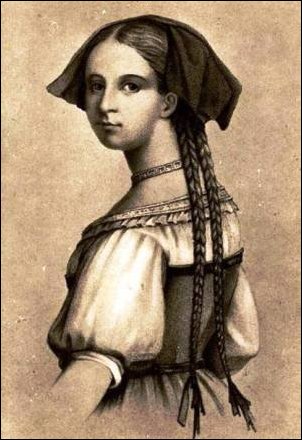
Goethe: Vier Liebesgedichte
KEMPIS poetry magazine
More in: Goethe, Johann Wolfgang von
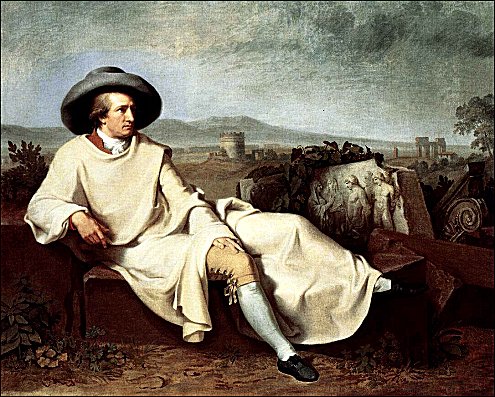
Johann Wolfgang von Goethe
(1749 – 1832)
M a i l i e d
Wie herrlich leuchtet
Mir die Natur!
Wie glänzt die Sonne!
Wie lacht die Flur!
Es dringen Blüten
Aus jedem Zweig
Und tausend Stimmen
Aus dem Gesträuch
Und Freud’ und Wonne
Aus jeder Brust.
O Erd’, o Sonne!
O Glück, o Lust!
O Lieb’, o Liebe!
So golden schön,
Wie Morgenwolken
Auf jenen Höhn!
Du segnest herrlich
Das frische Feld,
Im Blütendampfe
Die volle Welt.
O Mädchen, Mädchen,
Wie lieb’ ich dich!
Wie blickt dein Auge!
Wie liebst du mich!
So liebt die Lerche
Gesang und Luft,
Und Morgenblumen
Den Himmelsduft,
Wie ich dich liebe
Mit warmem Blut,
Die du mir Jugend
Und Freud’ und Mut
Zu neuen Liedern
Und Tänzen gibst.
Sei ewig glücklich,
Wie du mich liebst!
KEMP=MAG poetry magazine
More in: Archive G-H, Goethe, Johann Wolfgang von
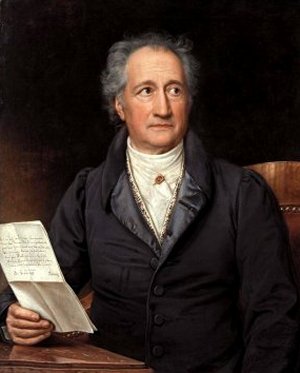
Johann Wolfgang von Goethe
(1749-1832)
Nähe des Geliebten
Ich denke dein, wenn mir der Sonne Schimmer
Vom Meere strahlt;
Ich denke dein, wenn sich des Mondes Flimmer
In Quellen malt.
Ich sehe dich, wenn auf dem fernen Wege
Der Staub sich hebt;
In tiefer Nacht, wenn auf dem schmalen Stege
Der Wandrer bebt.
Ich höre dich, wenn dort mit dumpfem Rauschen
Die Welle steigt.
Im stillen Haine geh ich oft zu lauschen,
Wenn alles schweigt.
Ich bin bei dir, du seist auch noch so ferne,
Du bist mir nah !
Die Sonne sinkt, bald leuchten mir die Sterne
O wärst du da !
More in: Archive G-H, Goethe, Johann Wolfgang von
Thank you for reading Fleurs du Mal - magazine for art & literature